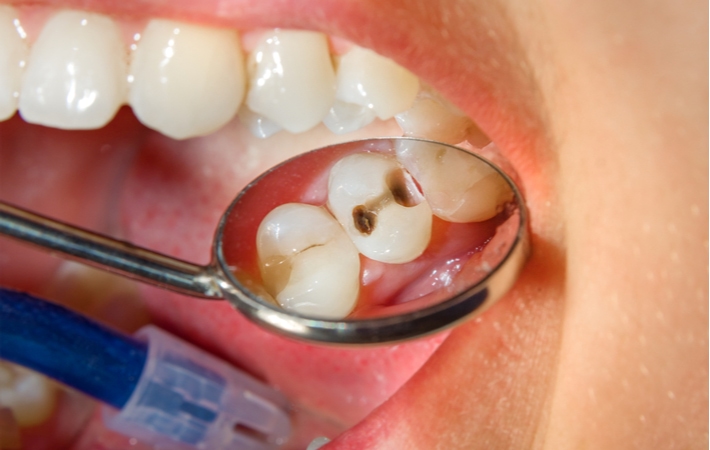Do You Have a Cavity?
If you meet with your dentist or hygienist regularly, you know the basics of how to care for your teeth. You know about brushing and flossing, and you’ve based your routine around preventing cavities. But what is a cavity? How can you tell if you have a cavity?
Whether you’re experiencing symptoms or haven’t noticed a difference, there are signs and symptoms pointing to the answer.
Dental exams can identify if you have a cavity, but what your dentist sees and what you see might not be the same. Knowing how to recognize a cavity can be the difference between a minor adjustment and a dental emergency.
What Is Tooth Decay?
A cavity is one of the stages of tooth decay, where a tiny hole forms on the surface of a tooth. Tooth decay is caused when bacteria and sugar mix in our mouths, creating a mild acid that eats at our enamel (the outer layer of a tooth).
Our saliva neutralizes the acids produced by the foods we eat. However, enamel erosion occurs when our natural oral defences are worn down. Common causes include sugary foods, teeth grinding, plaque, poor oral hygiene, certain medications, and medical conditions.
Plaque is a sticky film containing harmful bacteria that form on teeth. If plaque isn’t removed, it can harden into tartar which traps stains and causes tooth discolouration. Preventing tooth plaque through dental hygiene practices can significantly reduce cavity formation.
Cavity Symptoms
Even following good dental habits, you might still develop a cavity. Keep note of any symptoms or changes in your teeth and gums. Noticing a cavity earlier can help you treat the problem earlier and reduce further tooth decay.
The symptoms of cavities:
- Tooth sensitivity
- Tooth pain
- Visible hole in tooth
- Black or white tooth staining

The Stages of Tooth Decay
There are 5 stages of tooth decay, where a cavity is the second stage. Knowing the signs and symptoms can help you avoid worsening deterioration. If you notice any symptoms of tooth decay, book an appointment with your dentist as soon as possible.
Stage 1: Demineralization
Your teeth are made to resist the methods of breaking down food. We use our teeth every day, from salty snacks to delicious desserts to nutritious meals. As we chew our food, the enzymes in our saliva break it down, which releases a mix of acids in our mouth.
However, your teeth have a shield to keep away the acids and bacteria: enamel.
Enamel is the hardest substance in your body, covering your teeth as a protective outer layer.
Unfortunately, your enamel isn’t invincible. Plaque buildup causes bacteria to break down the minerals that form your enamel. One initial sign that your enamel is weakening is staining, usually appearing like white spots.
Stage 2: Enamel Decay
After your enamel is weakened, it’s more vulnerable to bacteria and acids. The white spots might darken, appearing more brown or black. Eventually, the breakdown causes a hole in the surface of your tooth (cavity).
Stage 3: Dentin Decay
Under your enamel is a layer called dentin. It’s a softer tissue that is more easily damaged. So if you experience tooth sensitivity, it’s often because the progression of tooth decay has reached dentin decay.
Stage 4: Pulp Damage
Pulp is the deepest layer of your tooth. The jelly-like pulp is a clump of nerves and blood vessels responsible for keeping the tooth healthy. When bacteria and acids attack the innermost layer, it can permanently damage the tooth. It can also cause swelling, pressure, and tooth pain.
Stage 5: Abscess Formation
An abscess is an inflammation and infection at the bottom of your tooth. The condition can cause severe symptoms, including:
- Bad breath
- Fever
- Foul taste
- Swelling
- Tooth sensitivity
- Puffy or red gums
- Throbbing (or sharp) pain
- Swollen lymph nodes
- Trouble breathing or swallowing
Keep Your Smile Cavity-Free
There are some risk factors you can’t control, but there are many more that you can. Knowing how to prevent cavities is the best method of caring for your oral health.
Create good dental habits for preventing cavities, including:
- Brushing your teeth at least twice a day
- Flossing every day
- Staying hydrated
- Limit sugary foods and drinks
- Waiting 30 minutes after eating before brushing
- Rinsing (or using mouthwash) after sugary foods and drinks
Oral care starts at home, but don’t forget about regular dental exams and cleanings. If you experience symptoms or want to know more about oral care, visit Markham Dental Smiles. We’re here to make your oral care comfortable. Talk to us to learn more about protecting your teeth from cavities and other oral health tips.







